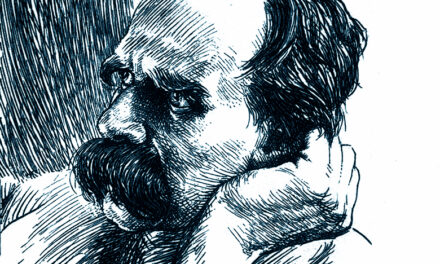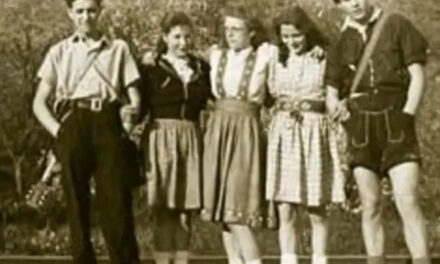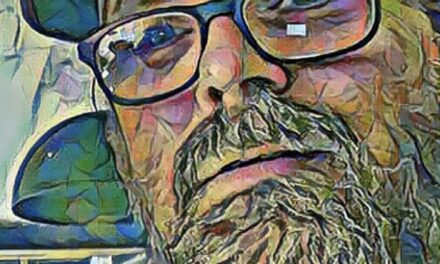I always hesitate to write about my ancestry because inevitably I’ll get a note from my parents informing me that I’ve gotten some detail wrong. But I know I have ancestors who came over on the Mayflower, and ancestors from Prussia who founded the town of Berlin, Pennsylvania, and an ancestor who arrived in the 19th-Century from Northern Italy. I am a product of all of these people and others besides, and so it can’t be said that I come from a strictly Anglo background or either a Catholic or Protestant background. I suppose I can boast a Western European ancestry, at least as far back as anyone can track.
So, it makes me wonder when I read things like this:
In August, a guest on Tucker Carlson’s podcast said something that immediately caught his interest. The United States faces a fundamental rift “between heritage Americans and the new political class,” Auron MacIntyre, a columnist for Blaze Media, argued. “Heritage Americans—what are those?” Carlson asked.
“You could find their last names in the Civil War registry,” MacIntyre explained. This ancestry matters, he said, because America is not “a collection of abstract things agreed to in some social contract.” It is a specific set of people who embody an “Anglo-Protestant spirit” and “have a tie to history and to the land.” MacIntyre continued: “If you change the people, you change the culture.” “All true,” Carlson replied…
…Senator Eric Schmitt of Missouri at the National Conservative Conference last month: “We Americans are the sons and daughters of the Christian Pilgrims that poured out from Europe’s shores to baptize a new world in their ancient faith.” America, Schmitt said, is “our birthright. It’s our heritage, our destiny.”
Let me start with something obvious. My pilgrim ancestors were hounded first out of England and then the Netherlands because of their religious beliefs. If they had lived in a religiously tolerant society, their ancestors would still be living in Nottinghamshire, or thereabouts. I don’t think I honor their legacy and my own lineage by advocating for a culturally, religiously and racially intolerant society here in America.
But my pilgrim lineage has no more claim to my identity than my Italian or German lineage. I can’t trace my heritage to only one part of myself, let alone identify in this way my birthright or destiny. I was born in New Jersey in the latter half of the 20th-Century, more than 300 years after the Mayflower reached Cape Cod. It’s this latter fact that makes me an American. And there are not parts of me that are more American than other parts. I’m one unique individual person.
The same is true of every other American, whether they can trace back to the earliest settlers or they were born here last week from undocumented immigrants.
I’d like to think my mere existence has changed the culture is some small way, but in truth I know that real influence requires real exertion. Yet, I acknowledge that waves of immigrants can have a collective influence. This was true of Irish and Italian waves, and it has been true of the Latino waves.
I’ll also note here, because it cannot be left unmentioned, that America’s culture has always been defined to a large degree by both its Native population and the descendants of the African slave trade. It’s not an accident that more than half of our states have names linked to a Native language and Black culture is inseparable from American culture.
So, this right-wing idea that there is a Heritage Culture that is the real culture of America is highly dubious. I’m particularly suspicious of this idea because I think it’s pretty weak even in the place where its proponents believe it is strongest.
Take for example, the fact that the first U.S. president that you could truly consider a Christian was our seventh, Andrew Jackson, and he first joined a church only after leaving office. All the prior presidents were more properly understood as Deists, or at least non-trinitarians. None of them would have signed up for the Nicene Creed. None of them would pass a confirmation test in any mainline or evangelical church today.
The Founders of this country precluded religious tests from office and secured freedom of conscience in the First Amendment. So, if we’re saying these folks were the real Heritage Americans, they simply weren’t aptly described as come “from Europe’s shores to baptize a new world in their ancient faith.”
I think it’s fair to say the architects of the United States of America were primarily from an Anglo-Protestant background. But it was not the kind of post-Great Awakening religiosity that developed later, much less the fundamentalist and evangelical strain that seems to dominate among conservatives today.
Nonetheless, it’s probably fair to identify a distinct culture that evolved among the dominant white population in America over its first couple of centuries. And it’s fair to say that culture isn’t as dominant today as it used to be for the simple reason that we’ve had a lot of non-white and non-Protestant and non-European immigration.
I can understand feeling like something important has been lost and that other things are threatened by the resulting cultural change. But “Heritage Americans” is still a poorly defined idea that only deserves to be taken seriously insofar at it presents a danger to those who don’t pass the test.
The idea is particularly dangerous when it is weaponized in service of a political movement that is tearing the Founder’s vision and separation of powers up by the floorboards.
It’s a great irony that the genius that the Anglo-Protestants bequeathed to us through their design of this republic is being jettisoned in supposed defense of an Anglo-Protestant birthright and destiny.
This is allegedly being done for my benefit—or, at least for the 2/3rds or so of me that can claim a genetic tie to so-called Heritage Americans. I don’t see any benefit in this whatsoever.
I see a benefit when there is a Taco Truck on every corner.








Yeah, I am one, but it’s “Southern Genealogy” which means it’s likely entirely bullshit. I was told, for instance, that Revolutionary War General Lachlan McIntosh was an ancestor. WE NAMED OUR DAMNED KID AFTER HIM! Then more digging shows that A) We were not descended from him and B) the McIntosh who claimed to be his brother that we did descend from was likely LYING ABOUT BEING HIS BROTHER. In fact, he was probably one step ahead of the law and changed his name to earn the credulous protection of the prestigious General.
In short, most of the people who came over her in the 17th and 18th century were most likely running from something at home. That’s the legacy.
“We’re Americans…. Our forefathers were kicked out of every decent country in the world. We are the wretched refuse. We’re underdogs. We’re mutts.” https://youtu.be/YXjqTyQuq4w?si=5C9JqTEj7l_SsC5B